How to generate leads using Facebook Groups helps expand an excellent business opportunity that focuses on reaching potential customers and creates valuable communities around the product or service offered. The focus on Facebook Groups lead generation helps bring in a sense of relationship and trust with the target audience, ensuring this brings about higher brand loyalty, customer engagement, and eventually sales.
In this guide, we’re going to explore how businesses can leverage Facebook Groups lead generation strategies-ideas on creating and growing a group to engage with prospects and content posting that adds value to your community. Let’s go inside how Facebook Groups lead generation can be a game changer for your business.
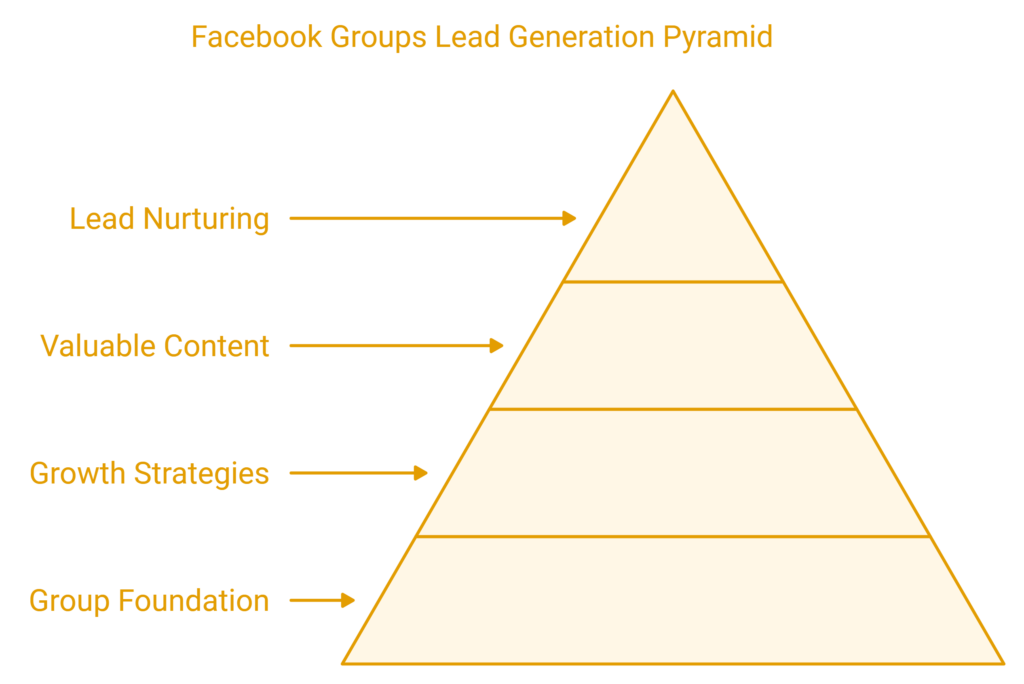
1. Why Facebook Groups Are Great for Lead Generation
Facebook Groups have now become one of the most powerful tools for businesses to create a community and get closer to their audience. It creates an environment where customers, prospects, and fans interact with each other, share ideas, and get to know more about the brand.
Here’s why Facebook Group lead generation is so effective:
- Community Building: Groups are built to facilitate community interaction. While Facebook Pages is more of a broadcast feature, the feature of Facebook Groups allows for two-way conversations, thereby making it easier to connect with prospects on a much deeper level.
- They get higher engagement since people in Facebook Groups actually choose to become part of a particular community, which is more engaging than if they’re simply following a Facebook Page. Consequently, higher engagement offers a better lead-generation opportunity.
- Targeted Audience: As you set up your Facebook Group, you can segment it by niche topic related to your business. That means that only interested parties will be in the community, causing it to be a much more targeted audience for Facebook Groups lead generation.
- Valuable Insight: Business will learn valuable aspects of their audience’s needs, preferences, and pain points through Group Discussions and Interactions with Businesses to change related products, services, and marketing ideas.
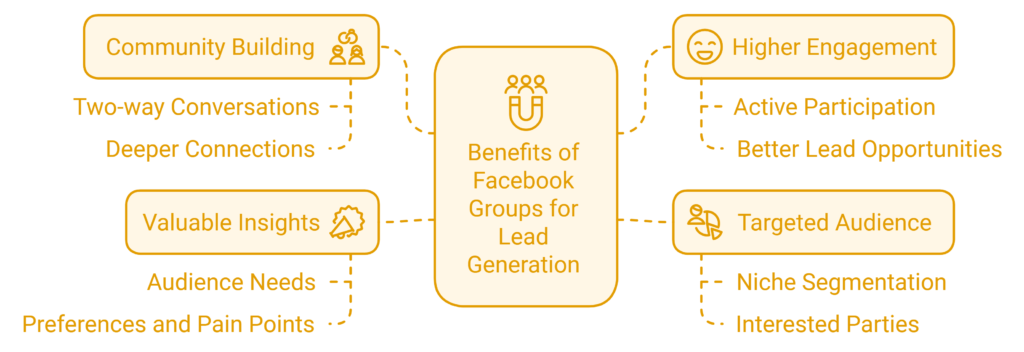
2. Building and Managing a Facebook Group for Business
Creating a Facebook Group for business can be the first step in leveraging your potential for Facebook Groups lead generation, but setting up a group is not enough. It is important to structure, promote, and manage it strategically in order to use up all its potential.
a) Choose a Clear Niche and Purpose
Your Facebook group has to work in your business interest. You specify what particular niche you are interested in focusing on. For example, if you run a fitness business, then you would create a health and wellness group and even subgroups for weight loss or building strength.
The purpose of your group should be evident in the name and description. Clearly define what members can expect and what value they will gain from belonging to the group. A group like “Healthy Eating for Busy Professionals” targets a specific audience and provides value to that niche.
b) Establish Group Rules and Guidelines
Clear rules and guidelines in your group make it positive and productive. It should outline what kind of behavior is acceptable, how members should treat each other, and what content is appropriate. This would help set expectations for the group and prevent spammy or irrelevant posts.
In your group description include what benefits they would gain in your community and why they should not leave. It gives them a feeling of belongingness, therefore making chances to stay and remain involved greater. That is quite critical for Facebook Groups lead generation.
c) Update your group settings
You can set up your group based on the needs you may have on Facebook. You can make your group public, closed, or secret. To generate leads using community groups, it is always best to have a closed group so that only members can see the posts and content that are being shared. That way, you will find more people who will join because they feel included and part of the group.
Ensure your group has an extremely attractive cover photo that speaks of your brand and the theme of your group. Your group’s cover photo should speak to the value proposition of the group right away. You can even put a call-to-action in your cover photo, such as “Join us for daily tips on healthy eating!”
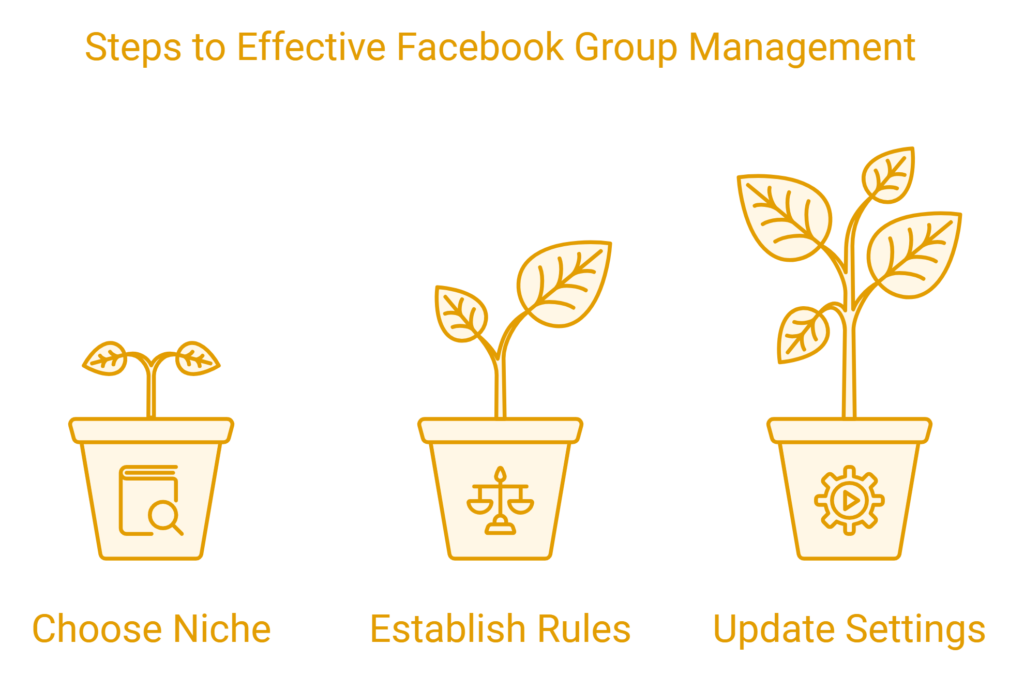
3. Growth Strategies for Your Facebook Group
Now that you have your Facebook Group, the real question is how to expand. A small group won’t truly drive leads for Facebook Groups unless the members of it are active and participatory. The following are a few tactics that will grow the group and bring it in the right type of membership:
a) Promote across multiple channels
Organic growth should not be counted upon solely to expand your group. Promote it on any and all channels that may be available to you—to your site, email list, your social media pages, paid ads, for example—you name it. You put a link to it in your email signature, or you have it appearing in your blog posts. You use your business’s Instagram account, Twitter, or even LinkedIn to drive the interest of your audience to it.
b) Team Up with Influencers or Industry Leaders
Partner with influencers or industry leaders who have the same target audience as you. This can become an excellent way to drive traffic to your group. Request that they mention your group in their posts or co-create live sessions or webinars. Such collaborations can bring new members who are already interested in your niche, hence offering a more targeted audience for Facebook Groups lead generation.
c) Use Referral Programs
Reward the present members to refer their friends or colleagues with incentives in terms of discounts, exclusive content or freebies. A referral program may be created to motivate the existing community to contribute to organic growth. This will significantly increase the visibility of the group and memberships.
d) Leverage Facebook Ads
Organic growth is important, but you can also expedite the growth with Facebook Ads by promoting your group. You can target the ads to the people who are likely interested in the topic of your group, and you can gain new members interesting in what your group has in a short time. Running Facebook Ads that tell people the benefits of joining your group can boost conversions and engagement.
e) Participate in Other Relevant Facebook Groups
Don’t market your group in a vacuum. Join other relevant Facebook Groups where your ideal target audience hangs out. Comment, share insights, and help solve problems to engage with the members. When you are known as a helpful and knowledgeable resource, invite these members to join your group.
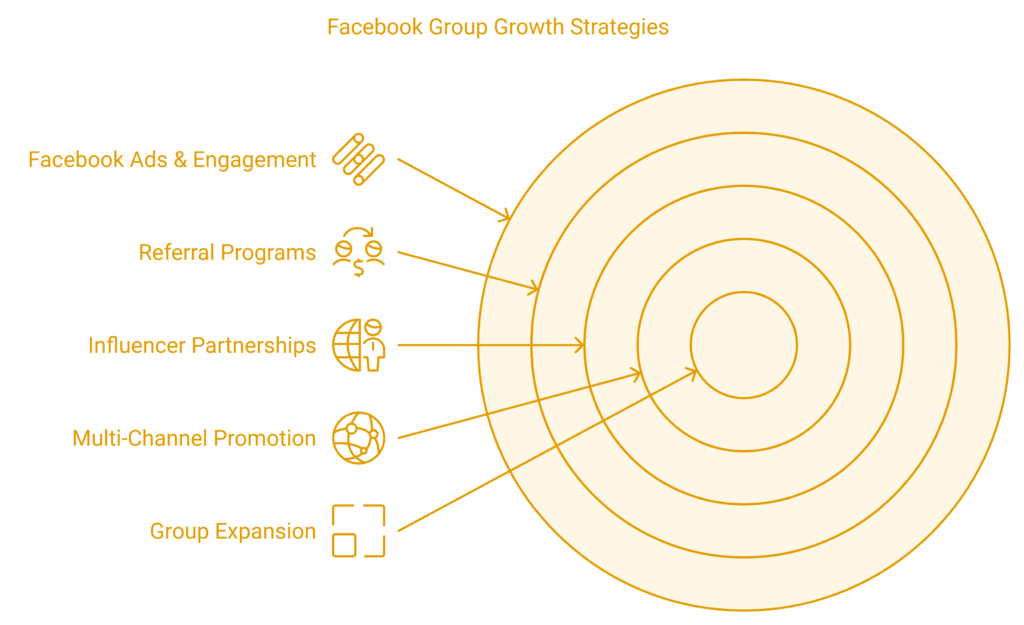
4. Posting Valuable Content to Generate Leads
Once you’ve built and grown your group, it’s time to focus on creating valuable content that will attract and engage potential leads. Posting valuable content is the key to Facebook Groups lead generation because it positions your business as a trusted authority and keeps members engaged with your brand.
a) Share Educational and Problem-Solving Content
Share content that educates or solves problems for your group members. This can be in the form of tutorials, step-by-step guides, or solutions to common challenges your audience faces. For instance, if you are running a digital marketing business, you may share tips on how to increase website traffic, optimize social media ads, or improve SEO rankings.
b) Use Polls and Surveys to Understand Your Audience
There are some good tools such as polls and surveys, where you can get an understanding of what your audience wants to see and what it dislikes. You can make engaging content like polls and simultaneously gain valuable information to influence your lead generation strategies. For example, if you’re in the fitness business, you can ask members what they’re looking for to improve their health, which might be losing weight, getting bigger, or getting fitter. This will help you tailor future content to their specific needs.
c) Success Stories and Testimonials
Nothing is more believable than to have success stories and testimonials. Your customers or clients should be showing the world how they got benefits from your product or service. Real-life examples of achievement can motivate potential leads to be active, as they now see themselves getting similar achievements.
d) Live Q&A or Webinars
Live Q&A sessions or webinars can be a great way to connect with your community while providing value. Live events give you the opportunity to answer questions, provide advice, and demonstrate your expertise in real-time. You can even use such events to offer limited-time discounts or promotions, thereby converting interested members into leads. Announce these events well in advance to generate buzz and encourage sign-ups.
e) Share Exclusive Offers or Discounts
Convert your members into leads by offering exclusive deals or discounts, which may be accessible only to group members. The feeling of exclusivity might make prospects join your group and share your content. If it is a course, product, or service, you are selling, let group members know they can have a special promotion just because they’re part of the community.
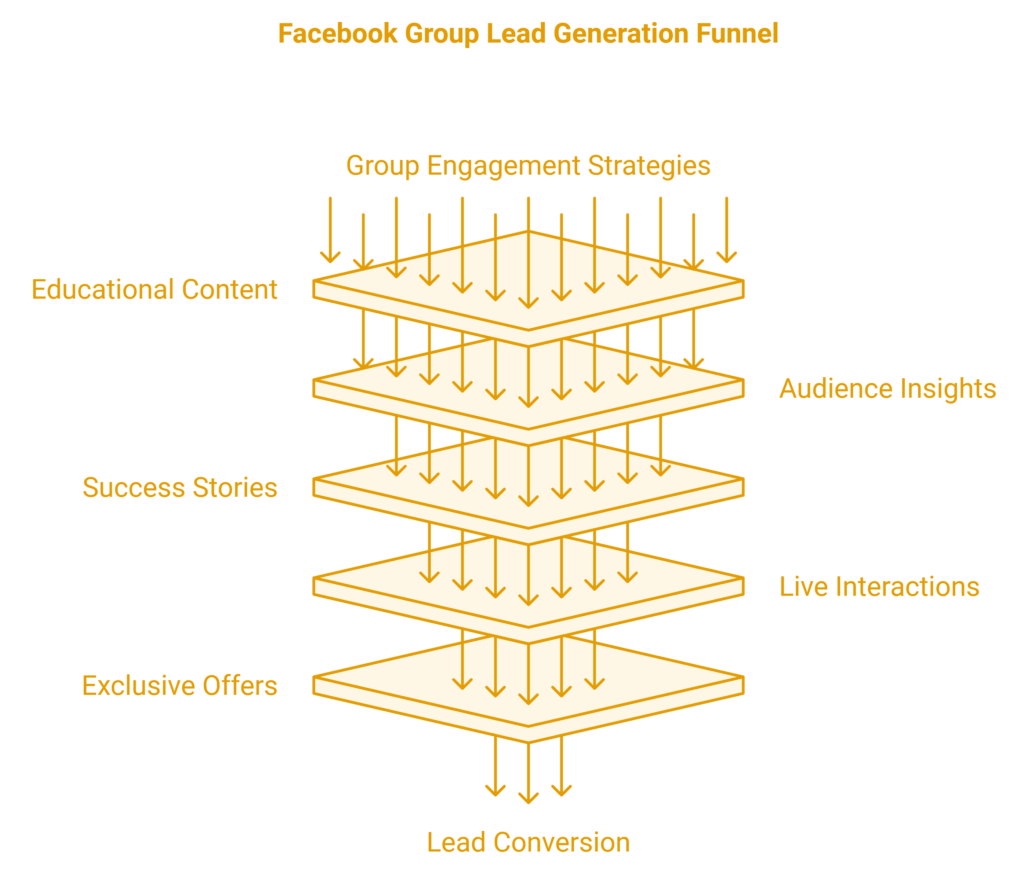
5. Nurture leads in the group
Once you’ve attracted leads into your Facebook Group, the next step is nurturing them. Unlike traditional sales tactics, nurturing leads in Facebook Groups is all about building trust and offering continuous value. Here’s how to do it effectively:
a) Engage Regularly with Members
As a group admin, you should interact with your members often. Provide answer questions, join discussions, and give feedback that is of value. Being active in a group means that you care about your members succeeding and are a trusted authority in your field.
b) Segment leads by interest
Not all leads are the same and must also be treated differently. Segments leads on behaviors or interests and send different messaging to each group. For example, a real estate agency may break up their list into homebuyers, renters, and investors so you can offer different content and services to different groups.
c)Follow Up Outside the Group
After generating leads from the group, send them a private message or email and give them even more personalized content, resources, or one-on-one consults. Always respect privacy, but never miss the chance to move prospects closer to a buying decision.
Conclusion
Facebook Groups lead generation is one of the most effective strategies a business can use to connect with their audience, develop relationships, and generate sales. With a well-crafted targeted group, posting of valuable content, and interaction with members, businesses can turn Facebook groups into a goldmine for leads. Bear in mind that success requires consistency, patience, and a willingness to see your audience succeed. With these methods, you will create quality leads and established communities that work for your business in the long run. Check out other blogs for more information: Lead Generation Strategies for Real Estate Agents